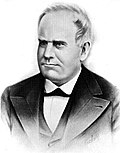| Missouri's 4th congressional district | |
|---|---|
Interactive map of district boundaries since January 3, 2023 | |
| Representative | |
| Population (2024) | 784,156 |
| Median household income | $68,144 [1] |
| Ethnicity |
|
| Cook PVI | R+21 [2] |
Missouri's 4th congressional district comprises west-central Missouri. It stretches from the northern half of Columbia to the southern and eastern suburbs of Kansas City, including a sliver of Kansas City in Cass County and parts of Blue Springs in Jackson County. It also includes the portion of Columbia north of Interstate 70, home to the University of Missouri (but not the university itself).
Contents
- Recent election results from statewide races
- 2023–2027 boundaries
- 2027–2033 boundaries
- Composition
- List of members representing the district
- Election results
- 2010
- 2012
- 2014
- 2016
- 2018
- 2020
- Prior results
- See also
- References
The district is predominantly rural and relatively conservative; Donald Trump defeated Kamala Harris 71% to 28% in the 2024 election and defeated Joe Biden 69% to 29% in the 2020 election. [3] The district is currently represented by Republican Mark Alford, a former reporter for WDAF-TV, the city's Fox affiliate.
This district had historically been a Democratic Party stronghold. Antipathy to the Republican Party had its origins in the American Civil War and the infamous General Order 11. The Union Army ordered evacuation of the county in an attempt to reduce support for and the power of bushwhacker guerrillas. After the Civil War, there was disfranchisement of white males (mostly Democrats) who had been active for the Confederacy until they took loyalty oaths, or until 1870. The area was filled with conflict between Missouri's Radicals, who joined the Republicans, and Conservatives, who were Democrats. By 1880 former secessionists dominated Missouri's congressional delegation and state legislature[ citation needed ].
Gradually this area developed a character similar to yellow dog Democrat districts in the South. Until 2010, only one Republican had been elected here since the Great Depression, and only for one term. However, several demographic trends have converged to erode the Democratic base in this district. First, as the New York Times election maps show, the predominantly rural counties lining the Missouri River have sharply trended Republican between the 2000 Senate election and the 2006 election, following trends across the South. [4]
Secondly, population losses in Kansas City resulted in the 4th gradually losing much of its share of heavily Democratic Jackson County to the Kansas City-based 5th district. Until 1983, the district stretched as far as Independence on Kansas City's eastern border; as late as 1973 it included the eastern portion of Kansas City itself. To compensate for the loss of territory closer to Kansas City, large portions of heavily Republican Southwest Missouri were reassigned from the neighboring 7th district. [5] The result of these trends resulted in a dramatic collapse of Democratic support in the district. Al Gore, John Kerry, and Barack Obama won less than 40% of the vote here. It ultimately presaged Ike Skelton's defeat by Vicky Hartzler in 2010. Since Skelton's defeat, no Democrat has managed even 40 percent of the vote.
Missouri's 4th congressional district includes all of 20 counties and portions of another 4 counties: Barton, Bates, Benton, Boone (parts), Camden (parts), Cass, Cedar, Dade, Dallas, Henry, Hickory, Howard, Jackson (parts), Johnson, Laclede, Lafayette, Morgan, Pettis, Polk, Pulaski, Saline, St. Clair, Vernon, and Webster (parts). [6]































